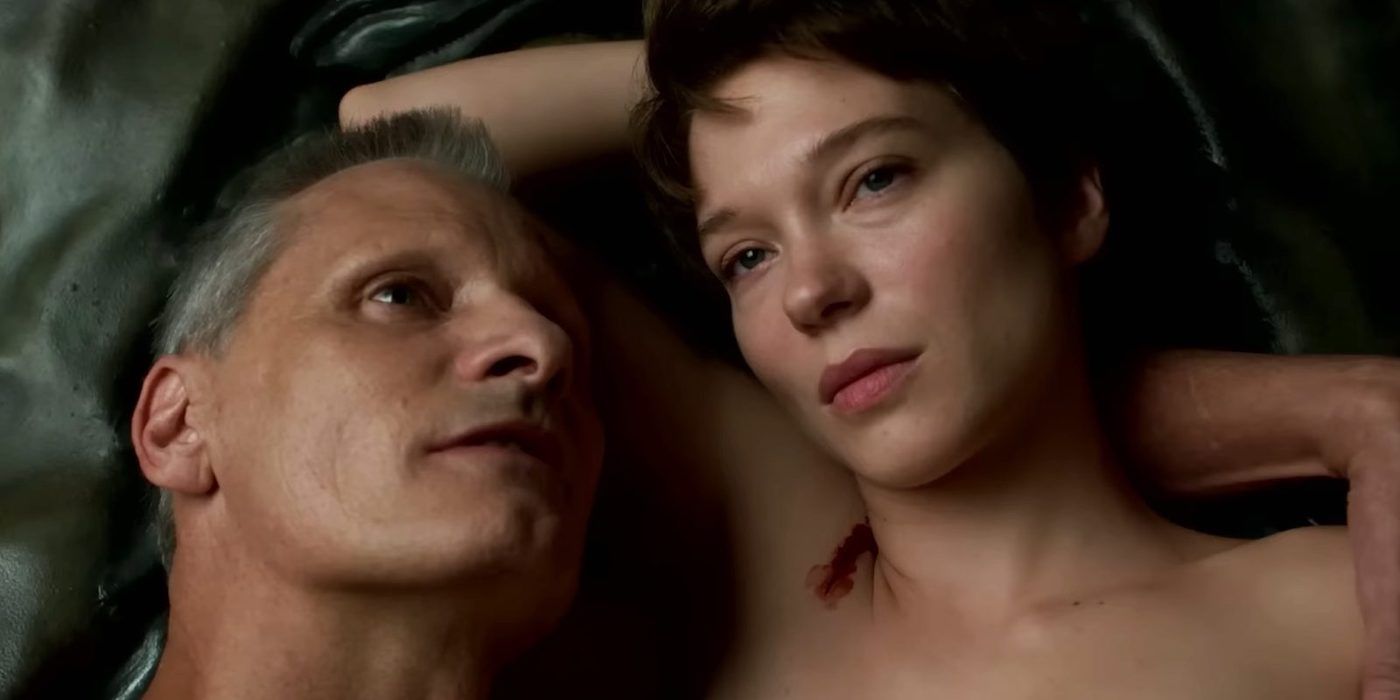With body horror legend David Cronenberg returning to the genre after more than two decades, there are many reasons for us to be excited about Crimes of the Future. However, while Cronenberg’s latest film does deliver some of the most gruesome images in recent cinema, Crimes of the Future is much more than a brutal horror flick. Just as with his previous works, Cronenberg uses his latest movie to discuss the uncomfortable existence of the human body, the limits of sexuality, and the distinction between the natural world and our anthropocentric perspective of reality.
While Crimes of the Future takes place, well, in the future, Cronenberg builds a paradoxical world where advanced technology lives side by side with decay. First of all, Crimes of the Future is not set in a post-apocalyptic version of Earth as humanity seems to keep thriving. That’s evident due to the presence of miraculous machines that can heal any wound and even reshape the human body. Even so, every building seems to be eroding in Crimes of the Future, with cracks spreading through walls and ceilings while the dust settles on every surface. Besides that, rust covers any metallic object, and the constant noise made by flies indicates rotten things are lying in every street. While the contrast between a decaying world and revolutionary technology might seem odd at first, it reveals a great deal about the discussion Cronenberg is trying to incite with his latest picture. That’s because, while exploring what it means to be human, Crimes of the Future questions how self-centered we are as a species.
Crimes of the Future takes place in a moment in time when humans have evolved away from pain. As a result, only a few humans can experience pain in the film, and only during their sleep. Besides that, germs seem to have stopped affecting human biology, freeing people from the fear of getting sick. So, without pain or the fear of disease to regulate human behavior, people soon start experimenting with their bodies, performing invasive procedures to test their limits. In this reality, many artists entice the public by opening their own bodies to surgery before an audience, giving meaning to the internal guts that were only functional in the past.
When we think about futuristic films, we imagine a world filled with metal, glass, and technological wonders. We also frequently picture a clean world, where an army of robotic slaves works ceaselessly to eliminate any traces of dirt. Since Crimes of the Future revolves around surgery and auto-flagellation, one could think that Cronenberg’s latest film would double down on these tropes, building a sterile world inspired by a surgery room. Nevertheless, the cities of Crimes of the Future look more like ruins than the homes of advanced humans. That’s a deliberated choice by Cronenberg that serves two intertwined purposes.
First of all, the film tries to discuss how industrial progress led to the natural world's destruction. From the very first scene of Crimes of the Future, we can see massive oil rigs half sunk in the sea while boats lie still in dried harbors from where the sea has long departed. While the film focuses on the human body and the metamorphosis of human existence, every time the natural environment comes into the picture, it’s to remind us that the future is a desert where humanity's predatory action leads to the destruction of everything that surrounds us. It’s a clear ecological message that resonates with our pressing concerns that it might be too late to save the planet’s natural order. But more than exposing our destructive nature, Crimes of the Future decaying environment is also a testament to the anthropocentric selfishness of the species.
In Crimes of the Future, humans are no longer worried about their own destruction by germs, infections, or diseases, so they just stop caring about the world around them. As the movie underlines, people have even stopped washing their hands in this dystopic future. Humans are so self-centered that all the money, time, and effort goes to manipulating their bodies. No one cares anymore about conserving things, repairing buildings, or keeping spaces tidy and clean. The point Crimes of the Future is trying to make is that humans are so selfish that we only take care of the world around us because it affects us directly. Once things stop influencing our direct well-being, we just abandon them and focus on ourselves. While Cronenberg’s point might seem bleak, it’s also an intriguing hypothesis that’s worth further discussion. Can we really say that we perform our everyday tasks out of concern for the world? Or is our moral compass always pointed to our selfish survival? How many things that we find painful to do in our everyday life would we keep doing if they no longer affected us directly?
As Crimes of the Future underlines, "body is reality" in the future. That means human perception is molded by the limits of their pleasure and their will to prevent discomfort. Humans in Crimes of the Future chop their bodies, trying to rearrange themselves in the search for an uncopyable individuality. They also witness invasive surgical procedures in hopes of creating a sense of intimacy with other bodies. Finally, humans expose their entrails to allow the world to witness their existence. And while all these actions are bloody and potentially disturbing, they are nothing more than an exaggeration of how humans from the present already behave.
Body is reality in Crimes of the Future, but body is also reality in our times. Unless it affects us directly, we close our eyes to the planet's destruction. And our care for our immediate environment is mainly derived from our sense of self-preservation. So in many ways, what doesn’t affect our bodies directly is not perceived as part of our reality. While the same could be said for any species, humans are conscious of their own existence, and therefore capable of measuring the effects of their actions. The fact that we don't is a testament to our selfish nature. This thought turns Cronenberg's latest film from a fantastic exploration of future humanity into a disturbing cautionary tale. And this discussion wouldn’t even be possible without the contrast between a decaying world and the technological wonders Cronenberg shows in Crimes of the Future.



